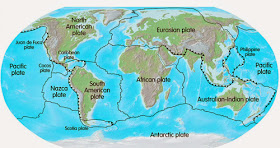This post is dedicated to my Smith geologist friend, Dot, on her birthday. We surely enjoyed many a puddingstone outcrop in New England! Here is a thin section of the Roxbury Conglomerate, informally known as the Roxbury puddingstone:
Last fall's puddingstone post remains the most popular at PEOTS so a tangential revisit to these conglomerates is in order:
The article linked below discusses proof (but not necessarily in the puddingstone) and theory as being two of the most misunderstood and misused words regarding science:
MISUSED SCIENTIFIC WORDS: FROM THEORY TO PROOF TO ORGANIC
It's a good list. Ten items is a reasonable number to absorb--like the 10 items at the fast line at the grocery store or David Letterman's top 10 list. It's a catchy way to get the general public thinking about scientific vocabulary. It's not perfect but it'll do.
I'd like to focus on the first two words, proof and theory, but the other eight words/phrases are worth a look also.
The phrase "Theories are malleable, but not infinitely so" resonated with me. We know plate tectonics is essentially the way features on the earth's surface are formed, but it is the constant refining and sculpting with more and more data that makes the theory malleable and testable (since Alfred Wegner proposed it in 1939). The defining characteristic of all scientific knowledge, including theories, is the ability to make falsifiable or testable predictions (as we've discussed earlier).
"The fact that science never really proves anything, but simply creates more and more reliable and comprehensive theories of the world that nevertheless are always subject to update and improvement, is one of the key aspects of why science is so successful." We don't really "prove" things. We refine, bolster, add to a mountain of evidence. . .but scientific proof is different from that "proof is in the pudding(stone)." We can't taste the fruits of our research and get the "proof" as we can in cooking.
The hot, steamy cooking of the earth like this Fly Geyser in Nevada, remains part of the theory of plate tectonics. We just can't consume it or prove it:
Here's to another great trip around the sun,
Steph (Word Woman)




I would take issue with the discussion of "proof". In some areas of science, strict mathematical proof is commonly used, and means what most people understand it to mean.
ReplyDeletejan, I can see that also. I understood "proof" to mean proof of larger theories. There certainly are supporting smaller pieces that have strict mathematical proof. For example, saying plate tectonics is a real phenomenon on earth vs. the measurements of different rock polarities on either side of the mid-Atlantic ridge. The polarities can be strictly measured, offering " proof " of plate tectonics. Did you have a specific example in mind?
DeleteE.g., my son is an economist, works in game theory. His papers consist largely of mathematical proofs. Theoretical physicists and, of course, mathematicians are also scientists whose work involve proofs in the strict sense.
DeleteGetting into the realm of mathematical proofs and logic is an area where Lego is touching on at Puzzleria!
DeleteIt always surprised me to see one could "prove" something "true" in a logical proof that is not necessarily "true."
Ok, I've run out of " ".
“…and the rockets’ red glare, the bombs bursting in air, gave proof through the night that our flag was still there.” Or maybe “gave a theorem through the night…” (better alliteration), or maybe the flag was a only a hologram.
Deletejan stole my thunder (just as Prometheus stole my fire). My question would have been: “Are geometric and algebraic proofs/theorems included under the umbrella of “scientific proof/theorem”?
All I know is that “The squaw of the hippopotamus is equal to the sum of the squaws of the other two hides,” seems pretty solid so far.
It seems as if the non-“pure-math” sciences (physics, biology, geology, chemistry etc.) are like poetry when you compare them to math. There is more “real world” in them. More “mess” and “wiggle room.” Math sometimes seems like a black-on-white etching (not even shades of gray) in a “science museum” awash with living color.
Thanks for the top-ten list, SS. I was taken by “natural,” which in my experience has become a kind of non-word that means everything and nothing, like “love,” “truth,” and “spirit.” I try to avoid using it in my writing, especially my scientific writing ;-) .
Also, thanks for the Puzzleria! shout-out. Ands=, I obviously have not run out of “ ” “ ” “ ” “ ” “ ” “ ” “ ” “ ”……, and “never will!”
LegoLemma
WW: not sure what you mean about proving something true in a logical proof that is not necessarily true. Are you talking about Gödel's incompleteness theorem, or about those joke "proofs", like showing that all triangles are equilateral?
Deletejan, I was referring to both Godel's incompleteness theorem and joke proofs. If p, then q statements have gotten me into hot water before.
DeleteTrue dat.
And how's your logic?
Naturally, "Lego." May the force, truth, and spirit be you.
ReplyDelete"Steph"
"Word Woman"
Enjoy! History myths deconstructed: fun, short video:
ReplyDeletehttp://www.npr.org/blogs/krulwich/2014/06/20/322947789/wrong-deconstructing-5-famous-history-stories?
Canadian-American border quirks:
ReplyDeleteBORDER QUIRKS